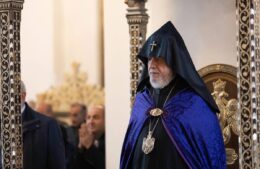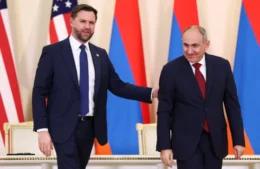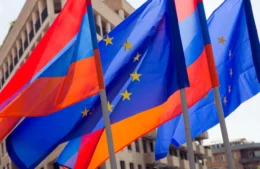The walls of injustice must crumble from within
- (0)
The walls of injustice must crumble from within –
On April 24, Rupen Janbazian and Varak Babian, editors of Ardziv magazine, travelled to Istanbul to take part in the commemorative events dedicated to the Centennial of the Armenian Genocide. Horizon Weekly recently caught up with Rupen Janbazian to discuss their visit.
What was the purpose of your visit to Istanbul on April 24?
My childhood friend Varak Babian and I thought it would be important to be in Istanbul for the Centennial of the Armenian Genocide; the city where the crime started 100 years ago. Over the past five or so years, a small, but fearless group of Turkish citizens including ethnic Turks, Kurds and Armenians, have been gathering on April 24 to commemorate the genocide. We figured it is important not only to see this first hand, but to also participate and lend our support.
After spending a week or so in Yerevan and participating in a few Centennial events there, including the open-air System of a Down night concert at Republic Square on April 23, we boarded a plane on the morning of the 24th and arrived in Istanbul just as the commemoration on Istiklal Street was beginning.
What took place at the commemoration at Taksim Square on the 100th anniversary of the Armenian Genocide?
On April 24, thousands held a commemoration at Istanbul’s Taksim Square. The commemoration event in Taksim Square included a Wishing Tree ceremony, when participants from Turkey and abroad tied strips of fabric to a tree as homage to the victims and the survivors of the genocide.
Following the Wishing Tree ceremony, participants held pictures of Armenian intellectuals who were murdered a century ago in Istanbul, including Taniel Varoujan, Rupen Zartarian and Krikor Zohrab. During their sit-in at entrance to Istiklal Street, participants were joined by thousands of protestors, who held banners and signs urging the Turkish government to recognize the Armenian Genocide. The demonstration, which was organized by the Nor Zartonk youth movement of Istanbul, began at Galatasaray High School (Galatasaray Lisesi), and saw participants marching down Istiklal Street to join the commemoration.
During the commemoration, Dr. Heghnar Zeitlian Watenpaugh, daughter of prominent Armenian intellectual and community leader Sarkis Zeitlian, delivered a speech in Armenian and Turkish on behalf of Project 2015. Project 2015 has been a two-year-long effort to organize members of the Armenian diaspora and others committed to human rights and genocide prevention in the US, Europe, and the Middle East to travel to Turkey to join this centennial commemoration.
Earlier in the day, human rights organizations in Turkey, under the umbrella group “100th Year—Stop Denialism,” gathered in front of the Museum of Turkish and Islamic Arts in Sultanahmet. The building was known as the central prison in 1915; individuals from the Istanbul Armenian community, including intellectual and cultural leaders, were arrested in their homes, detained here, and then sent off to the Haydarpasha train station. A commemoration was held at Haydarpasha with participants holding photographs of the intellectuals arrested and killed in 1915, and placards that demanded recognition and reparations for the Armenian Genocide. After a moment of silence, the crowd began the “Genocide March,” walking from Sultanahmet to Eminönü, and then crossing over to Haydarpasha by sea. The detainees of April 24, 1915, were deported from Haydarpasha to the depths of the country—in actual fact, to their deaths. Unfortunately, we didn’t make it in time to make it to the morning events, but we felt very lucky to be there for the evening commemoration and protest.
It is difficult to describe the energy that we felt there that day.
In your opinion, does Turkish civil society work towards spreading awareness about the Armenian Genocide in Turkey? How important is the role of the Turkish citizen in regards to genocide recognition today?
There is no doubt in my mind that Turkish civil society is changing – the commemoration and protest on the 24th was proof of this. When thousands of non-Armenian Turkish citizens are willing to risk their well-being and safety to shed light on the Armenian Genocide and demand that their government recognize the century-old crime, it is very telling that change is brewing in Turkey.
We must acknowledge, however, that these are small, initial steps, and that the majority of people in Turkey still don’t know about the genocide, or are convinced of a blurred version of the history.
We must also acknowledge, however, that there are alternative avenues and we must recognize that dialogue with Turkish civil society can be the catalyst to bring forth a mental shift, away from the nationalistic propaganda that has plagued generations of Turkish denialists.
It is imperative for us, Armenians from all around the world who are directly connected to the history of the Armenian Genocide, to be a part of this change. If the Turkish people learn the truth about their own past, they will surely demand their government to do the right thing and acknowledge their history. These people have a voice and a vote in Turkey and they are the only ones who can put pressure on their governments and ultimately bring about change in the country. Our only duty is to create a dialogue with these people so that we can educate them properly on the issue. I am convinced that once that happens, they will do the rest.
The walls of injustice must crumble from within, and it is our responsibility to help the process as much as possible.


















